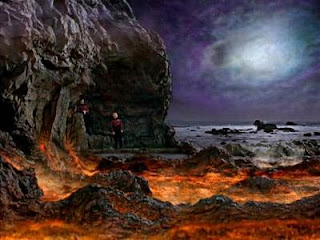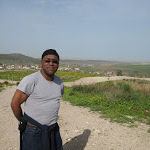Lately, I have come across several news stories regarding evolution and the fossil record (IO9, Yahoo News, Life Science). Normally, this is not a subject that I spend a lot of time on unless I happen to be teaching a class on Genesis, but between the news articles and a fantastic piece from Rachel Held Evans’ summer “Ask a . . .” series (check the whole series out, they are great!) entitled Ask an Evolutionary Creationist, the topic has been on my mind.
 |
| Picard and Q on primordial earth from the ST:TNG episode “All Goog Things.” Q’s line as they look into the ooze where life is to begin is classic. “Aw, nothing happened.” |
I am not a scientist; I am a pastor, but I am not against science. Science is not by default anti-God, nor is science and theology incompatible. Someone like me looks at the multiple dimensions required for string theory and sees the possibly of a scientific explanation of the spiritual realm. What if the resurrection is so important because the human spirit is not a separate non-corporal entity from the brain? (and here is a great NPR article on how prayer affects the brain) I am not saying any of my speculation here is true; I am just asking the questions. I am all for scientific and theological discovery, speculation, and debate, but I believe there are some things that we will never figure out because we cannot prove some theories through mathematics, experimentation, or travel backwards and forwards through time. Scientists and theologians look at evidence and propose theories in these areas based upon either a human/earth-centric worldview or a God-centric worldview. Both worldviews, and subsequent theories, require faith that their underlying worldview is correct. So, where do I stand?
Well, I do not think salvation rests in a correct interpretation of the first 11 chapters of Genesis, although how those chapters are interpreted does affect our doctrine. I have no problem with creation taking place in literal 24-hour days miraculously or scientifically. How can I say scientifically? I believe we cannot assume time is as constant as we perceive it to be. There are some scientists that believe the speed of light (which we call a constant) is actually slowing down. To me, that fits with the second law of thermodynamics (entropy). If things moved faster “in the beginning” (whatever beginning one is talking about) that could explain a lot (2 Pet. 3:3-4). I would imagine most physicists would not want to consider a decreasing speed of light because it would further mess up Newtonian physics, just as quantum physics has done. But it is not just scientists that do not like to go back to rethink and revise “laws” that have been foundational.
I also believe the Bible contains genres of literature. As someone who studies world mythology, I do not have a crisis of faith, and can still hold to the Bible being the word of God, if the first 11 chapters of Genesis are mythology rather than literal, but (and this is huge) if we do not take creation literally it requires we revisit several core aspects of Christian theology: Anthropology (the nature of humans), Harmartiology (the doctrine of sin), Christology (the doctrine of Christ), and Soteriology (the doctrine of salvation). The problems, just to name two, are: 1) If there is no literal Adam then how did sin (evil) and death enter the world, and how did we become separated from God? 2) If there is no literal first Adam, do we still have hope in a literal last Adam? (Rom. 5:14; 1 Cor. 15:20-22, 44-49)
I will say again, that origins is something that may simply be beyond our understanding, but the church must wrestle with these types of issues. It is difficult, but if we do not, the church could find itself on the wrong side of truth, as it was with Nicolaus Copernicus and Galileo Galilei.
©2011 Paul Tillman






